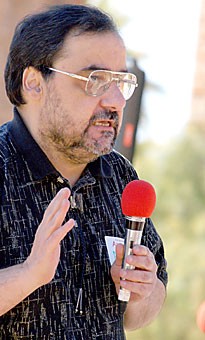A human rights and peace activist said religious sensitivity should limit the boundaries of free expression at a forum yesterday attended by more than 100 students, alumni and community members.
Moji Agha, a human rights and peace activist, used the public discussion on the Alumni Plaza to address issues surrounding the recent international turmoil stirred up by the publication of caricatures of the Prophet Mohammad in Danish newspapers.
Agha was invited by Tawfik Maudah, president of the UA Debate Club, which sponsored the event.
“”Freedom of expression is a sacred value,”” said Agha, a visiting scholar in the African-American studies department. “”Therefore, freedom of expression needs to be responsible.””
In addition to the Danish comics, a political cartoon published by the Arizona Daily Wildcat on Feb. 8 depicting the Prophet Mohammad also led as a centerpiece of discussion.
Initially the event was planned as a debate and the Wildcat was advertised to be the second party. But the Wildcat was advertised as a guest at the event before any confirmation had been given, said Aaron Mackey, editor in chief of the Wildcat.
Mackey said that before he could meet with other editors to talk about the debate or respond to the club’s request, Maudah began circulating fliers that named the Wildcat as an invited participant.
Mackey provided e-mail dated Feb. 13 that showed Maudah request the Wildcat’s presence at the event. Two days later, Maudah began distributing fliers with editors of the Wildcat advertised as speakers before any answer was given.
At that time, editors decided not to attend the event, Mackey said.
After hearing explanations for the absence of the Wildcat, Maudah said he and Agha were still disappointed with the newspaper’s response.
“”I think (not coming) is a mistake because I thought they would jump on this chance,”” said Maudah. “”I was really shocked when I heard they didn’t want to go.””
Though a second official party was not present to balance the discussion, one UA instructor in the audience stood up on behalf of free expression.
Kevin Kemper, a journalism instructor and an advocate for free expression, said he thinks the cartoon published by the Wildcat was in poor taste but defended the paper’s right to publish it.
“”I don’t think that the cartoons that were published in the Danish newspapers and other places rise to the level of incitement to violence in the law,”” Kemper said. “”There is just no excuse for the violence.””
Kemper, who has a doctorate in journalism, said he feels the press should exercise responsibility in publications without limiting free expression.
“”The argument against expression that offends (people) and the tying of that argument with the legal argument of incitement (of violence) is a slippery slope,”” Kemper said. “”I have a deep concern that when we start setting rules, rather than teaching one another to be civil, we’re just teaching one another to fear (each other).””
Agha and Kemper agreed before the debate to call it a “”dialogue”” rather than a debate, Kemper said.
Maudah, who moderated the event, said he disapproved of the publication of the cartoons, especially the one that ran in the Wildcat.
“”The ironic and strange thing about the cartoon that the Wildcat published is that, to a lot of people, it was more insulting and more demeaning than the Danish newspapers,”” Maudah said. “”It seems to me that those advocates of this type of freedom of expression are so lazy that they represent freedom of speech in a very irresponsible and incompetent way.””
Mike Birrer, a UA alumnus and audience member, said people generally don’t think about respect when it comes to free expression.
“”In general I believe in respect of all human beings,”” Birrer said. “”It would be better if (free expression) came from hearts who understand that people deserve respect.””
A “”Freedom of Expression”” contest led up to the event, with cash prizes promised to students who could best answer two questions on freedom of expression.
Jill Ryan, a junior majoring in Spanish, journalism junior Christian Payne and Justin Nashous were the winners of the contest and will be awarded today, Maudah said.









